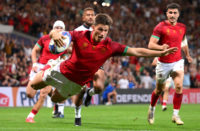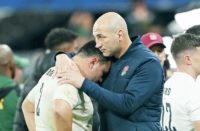
THROUGHOUT all the ups and downs of his mountainous career, Rory Best would never have allowed himself a rare moment of frivolity to think about fairytales.
This morning, thanks in no small measure to the unwitting connivance of the Grand Slam champions, Ireland's venerable captain might be tempted to become a believer.
A fortnight after giving the impression that the roof had caved in on him during a Red Rose hurricane which raised awkward questions about his immediate future, Best left his favourite stage for the last time to learn that truth truly is stranger than fiction.
After 14 years and 120 Tests, the most durable of hookers marked his farewell by putting Ireland where they had never gone before. A fortnight after shipping eight tries and 57 points at Twickenham, Ireland will leave for Japan on Wednesday as the No.1 team on the official global rankings.
The All Blacks may have warmed up with close to a century of points against Tonga and they may be about to complete a hattrick of World Cups but they will arrive at the tournament behind the Irish. Even Best, in a moment of quiet reflection, will wonder how the numbercrunchers arrived at such a verdict.
World Rugby's ranking system must be based on a set of applied mathematics, differential equations and approximate theory of such complexity as to leave Galileo Galilei in a permanently stumped frame of mind. Gus Pichot having condemned the list as ‘ridiculous' last week, the mind boggles what word World Rugby's very own vice-president will use this week.
None of that will bother Best in the slightest. As he knows only too well, Ireland at the World Cup has been nothing but a long-playing record of gross underachievement, of never going beyond the quarterfinals even when they had the so-called golden generation of O'Driscoll, O'Connell and O'Gara.
At least the captain has got the ship back on an even keel in readiness for their opening match, Scotland in Yokohama in a fortnight's time. Wales start against Georgia 24 hours later in Toyota City, their fleeting presence at No.1 undone by back-to-back defeats against the country they outplayed in the Grand Slam clincher barely six months ago. At least Leigh Halfpenny finished unscathed, unlike the same weekend four years ago when his right knee buckled beneath him, causing enough damage to miss not just the last World Cup but 14 internationals in 14 months.
The one casualty, Rhys Patchell, barely lasted 20 minutes before a head blow prevented him going the distance.
The pre-match hype centred around convincing the sceptics that they would be watching a real international as opposed to contributing towards a money-making exercise. A cursory glance at the empty seats suggested that much of the baloney had fallen on deaf ears.
Days before departure for Japan, it amounted to nothing more than an exercise in self-preservation. That said, nobody dared risk taking the time-honoured short cut to injury by entering any point of contact in a half-hearted frame of mind.
Wales started as though intent on avenging their beating at home the previous week, dominating the first quarter while somehow managing the difficult bit of remaining pointless.
That their hosts offered them the usual unwitting encouragement via their wonky line-out made the early Welsh failure to capitalise all the harder to understand.
Best's first two throws ended up in the wrong hands and the third one might well have done had Wales not conceded a free kick for closing the gap before the skipper could take aim. Having taken all of 20 minutes to get as far as the opposition 22, Ireland wasted no further time showing how to seize the maximum seven-point reward. Furlong's stampeding run softened Wales up before CJ Stander's charge gave Rob Kearney the space for the opening try.
The seven points hurt Wales more than merely on the scoreboard, Patchell's attempt to stop Stander forcing him into an early exit after another blow to the head. His replacement, Dan Biggar, introduced himself by almost picking a try straight out of Johnny Sexton's pocket.
Keith Earls and Robbie Henshaw combined for the cover tackle which brought Biggar down desperately short of the line, Henshaw's burrowing preventing the fly-half from touching down.
To his credit, Biggar promptly provided a welcome reminder that old-fashioned sportsmanship does still exit, telling Mathieu Raynal: “I didn't get it down.''
The French referee needed no enlightment when Hadleigh Parkes got it down in some style from the ensuing five-metre scrum. The Scarlet Kiwi blasted the Irish midfield defence off its hinges, the angle and pace of his run taking him through a gap between Henshaw and Bundee Aki.
Wales reached half-time 10-7, deservedly and mysteriously in equal measure given that the margin did nothing to reflect their superiority. And that, for Wales, was as good as it got.
None of this may mean much in the global scheme of things but the second half turned out to be as barren a 40 minutes as Wales have inflicted on their supporters. Their collective sense of injustice at the interval had been replaced at the end by deep sighs of relief at having avoided a far heavier beating.
Victory over Australia in Tokyo in three weeks' time will render what happened in Dublin yesterday a complete irrelevance but for now the results of the four-match pre-World Cup campaign ought not to be swept under the carpet.



Until the middle of last month, Wales had swept all before them, a 14-match winning streak which gave Gatland ample justification for declaring that his players had ‘forgotten how to lose'.
Three defeats have had a jolting effect on their memory. Far from adding insult to injury after Ireland's humiliation at Twickenham,
Wales have now lost twice to a team whom they outplayed in Cardiff to complete the Slam barely six months ago. A team, what's more, who returned there last week demoralised by what England had done to them.
Despite being close to full-strength for yesterday's return, the manner of Wales' defeat will have renewed familiar concerns over their capacity for scoring tries or, to be more accurate, the lack of it.
Where England and Ireland have created 15 and 13 respectively from their four matches, Wales have managed six from theirs.
And give away ten second-half penalties anywhere in Japan as they did in Dublin and the World Cup verdict will be one of misadventure.





























